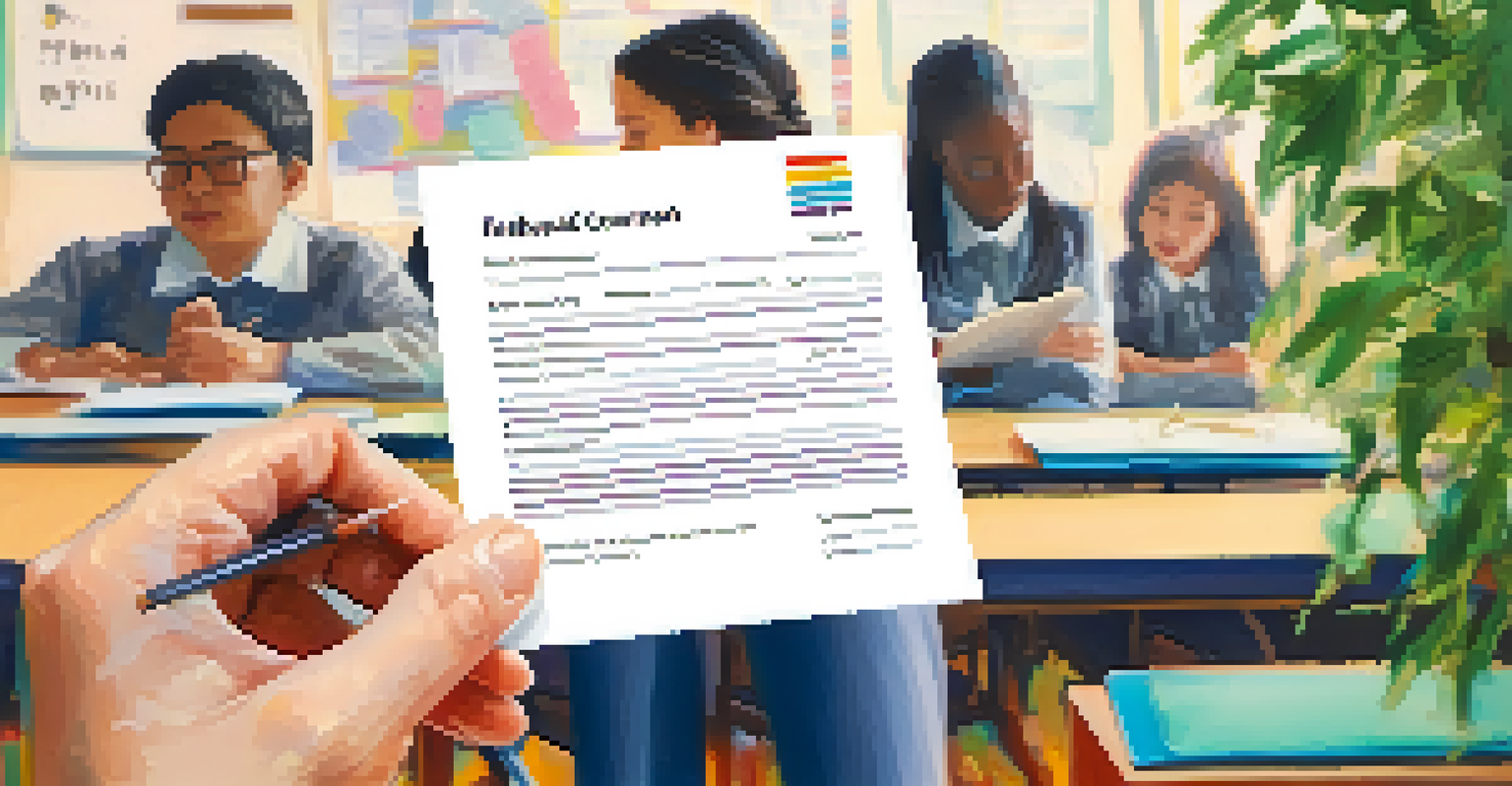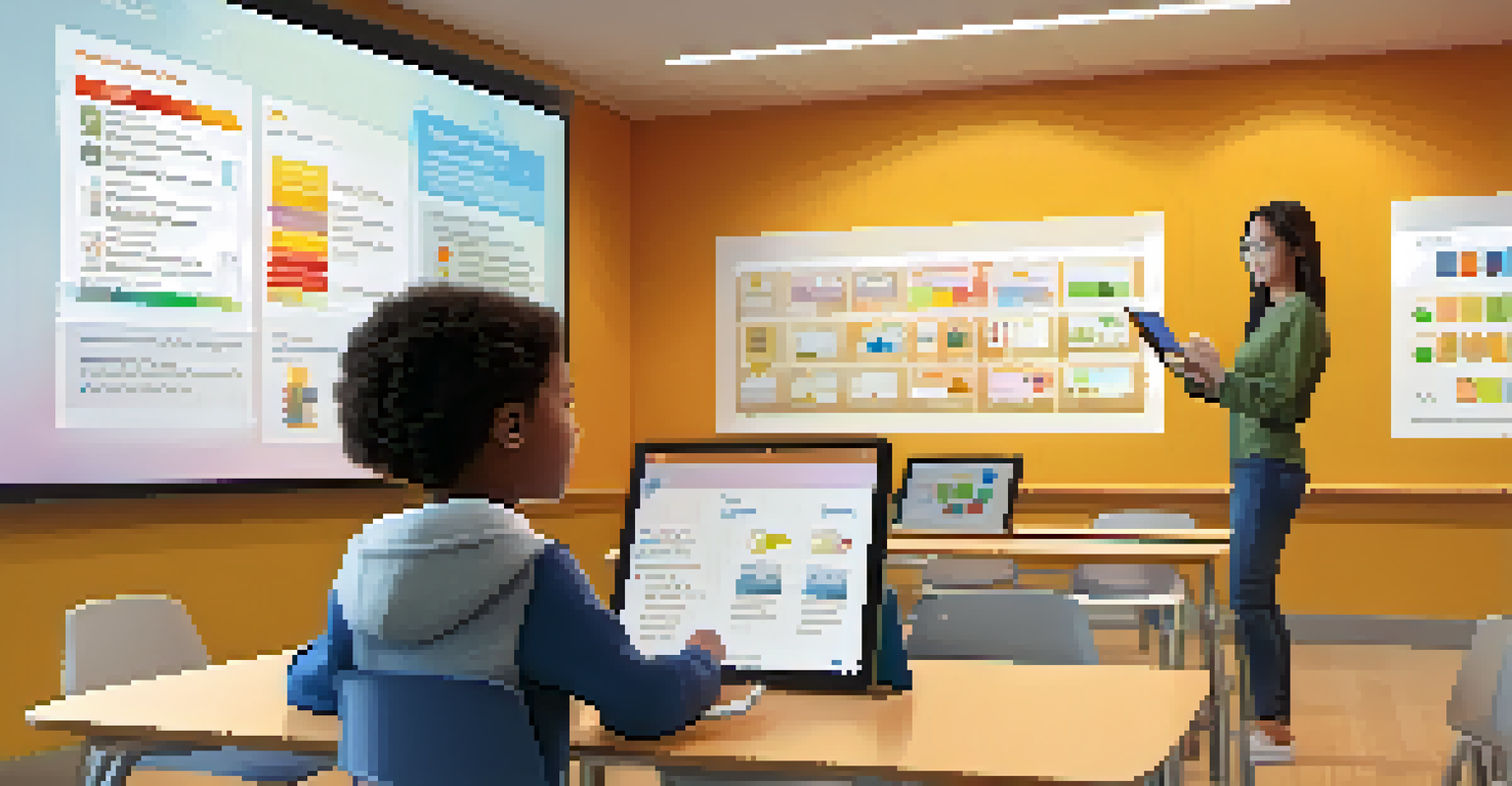The Role of Assessment in Shaping Student Motivation

The Importance of Assessment in Education
Assessment plays a crucial role in education, serving as a barometer of student understanding and progress. It provides educators with valuable insights into what students know and where they might be struggling. By evaluating student performance, teachers can tailor their instruction to meet individual needs, fostering a more supportive learning environment.
Assessment is the bridge between teaching and learning.
Moreover, assessments are not just about grades; they can motivate students by setting clear expectations and goals. When students understand the criteria for success, they are more likely to engage actively with the learning material. This clarity transforms assessments from a source of anxiety into a roadmap for achievement.
Ultimately, effective assessments can inspire a growth mindset among students, encouraging them to view challenges as opportunities for improvement. When students see assessments as tools for learning rather than mere evaluations, they are more likely to take ownership of their educational journey.
Types of Assessments and Their Impact
There are various types of assessments, each with its unique impact on student motivation. Formative assessments, such as quizzes and feedback sessions, provide ongoing insights that help students gauge their understanding in real-time. These assessments foster a sense of continuous improvement, motivating students to engage with the material actively.

In contrast, summative assessments, like final exams or large projects, often carry a lot of weight and can create pressure. While they are essential for measuring overall learning outcomes, the high stakes can lead to anxiety, which may, in turn, diminish motivation. Striking a balance between the two types can help maintain student enthusiasm and reduce stress.
Assessments Foster Student Growth
Effective assessments help educators understand student needs and motivate learners by setting clear expectations.
Additionally, alternative assessments, such as portfolios or presentations, can empower students by allowing them to showcase their learning in creative ways. This flexibility can enhance motivation by making assessment feel more personalized and relevant to students' interests and strengths.
Feedback as a Motivational Tool
Feedback is an integral part of the assessment process and can significantly influence student motivation. Constructive feedback provides students with specific information about their performance, allowing them to understand their strengths and areas for improvement. When students receive timely and relevant feedback, they are more likely to feel motivated to make necessary changes and enhance their skills.
Feedback is the breakfast of champions.
Moreover, positive reinforcement through feedback can boost students' confidence and encourage them to take risks in their learning. When students know that their efforts are recognized and valued, they are more likely to persevere through challenges. This creates a cycle of motivation where students feel empowered to push themselves further.
However, it’s important for feedback to be delivered in a way that is supportive rather than punitive. When students perceive feedback as a tool for growth rather than criticism, it can transform their approach to learning, making them more engaged and driven to succeed.
Creating a Positive Assessment Culture
A positive assessment culture is essential for fostering student motivation. This culture emphasizes growth, learning, and collaboration rather than competition and fear of failure. When schools create an environment where assessments are viewed as opportunities for learning, students are more likely to engage wholeheartedly in their education.
Encouraging a growth mindset within the classroom is one way to build this culture. Educators can model resilience and the value of effort, helping students understand that setbacks are a natural part of the learning process. This approach not only motivates students but also cultivates a supportive community where everyone strives for improvement.
Feedback Boosts Learning Motivation
Constructive feedback encourages students to recognize their strengths and areas for improvement, enhancing their engagement.
Furthermore, involving students in the assessment process—such as through self-assessments or peer reviews—can enhance their sense of ownership over their learning. When students take an active role in assessing their progress, they are more invested in their educational journey, leading to increased motivation and engagement.
The Role of Technology in Assessments
Technology has transformed the way assessments are conducted, offering innovative tools that can enhance student motivation. Online platforms allow for immediate feedback, enabling students to see their results and areas for improvement in real-time. This instant gratification can boost motivation as students can quickly adjust their learning strategies.
Moreover, technology can facilitate personalized learning experiences through adaptive assessments that cater to individual student needs. By tailoring assessments to different learning styles and paces, educators can help students feel more engaged and less overwhelmed. This individualized approach can be a significant motivational factor.
Additionally, gamified assessments can make the evaluation process more enjoyable and interactive. By incorporating elements of play into assessments, educators can create a more inviting environment that encourages students to participate actively and enthusiastically.
Addressing Assessment Anxiety
Assessment anxiety is a common issue that can hinder student motivation and performance. Many students feel immense pressure to perform well, which can lead to stress and disengagement. Recognizing this anxiety is the first step in creating a supportive environment that encourages learning rather than fear.
Educators can help alleviate assessment anxiety by promoting a balanced view of assessments. Emphasizing that assessments are merely one aspect of a student's educational journey can help shift the focus away from grades alone. Encouraging students to view assessments as opportunities for self-reflection can also reduce stress and enhance motivation.
Technology Enhances Assessment Experience
Innovative tools in technology provide immediate feedback and personalized learning, making assessments more engaging for students.
Moreover, teaching students effective study and coping strategies can empower them to manage their anxiety. Providing resources on time management, relaxation techniques, and positive self-talk can equip students with the tools they need to approach assessments with confidence and a growth mindset.
The Future of Assessment and Student Motivation
As education continues to evolve, the future of assessment will likely focus on enhancing student motivation through innovative practices. There is a growing recognition of the need for assessments to be more meaningful and aligned with real-world skills. This shift can help students see the relevance of their education, increasing their intrinsic motivation.
Moreover, the integration of social-emotional learning into assessments can foster a more holistic view of student development. By considering students' emotional and social well-being, educators can create assessments that not only measure academic skills but also promote positive attitudes toward learning.

Ultimately, a collaborative approach involving educators, students, and parents can lead to the development of assessment practices that genuinely motivate students. By prioritizing student engagement and well-being, the educational community can create a future where assessments serve as powerful tools for motivation and growth.